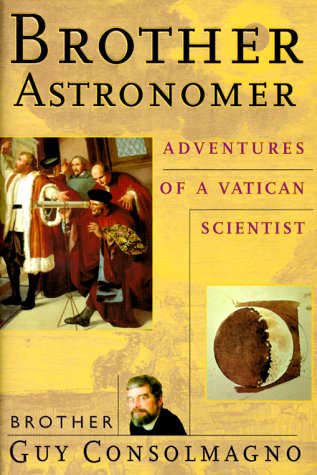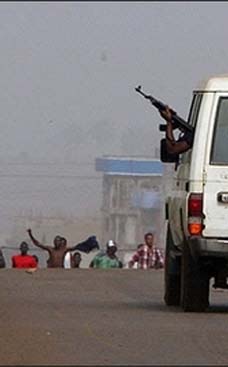2000.01.01: January 1, 2000: Headlines: Figures: COS - Kenya: Vatican: Religion: Catholicism: Astronomy: Science: Beliefnet: Kenya RPCV Guy Consolmagno says the discovery of life elsewhere in the universe would pose no problem for religion
Peace Corps Online:
Directory:
Kenya:
Special Report: Astronomer and Kenya RPCV Guy Consolmagno:
2000.01.01: January 1, 2000: Headlines: Figures: COS - Kenya: Vatican: Religion: Catholicism: Astronomy: Science: Beliefnet: Kenya RPCV Guy Consolmagno says the discovery of life elsewhere in the universe would pose no problem for religion
Kenya RPCV Guy Consolmagno says the discovery of life elsewhere in the universe would pose no problem for religion

"It has been posited that the discovery of life elsewhere in the universe would fundamentally change the way we humans think about ourselves. Maybe; but, to borrow an insight from the historian of science Stephen Dick, I suspect that change has already happened. I really don't think anyone who's aware of the science would be fundamentally changed by the discovery, because nearly everyone expects that it will happen eventually. Probably not in our lifetime; maybe not in the next millennium. But eventually." For the past 13 years, Kenya RPCV Guy Consolmagno has held one of the most secure and prestigious posts in the planetary sciences, as one of the Pope's 12 personal astronomers, dividing his time between the Vatican's observatory at the papal summer palace at Castel Gandolfo in Italy and a giant telescope in Tucson, Arizona.
Kenya RPCV Guy Consolmagno says the discovery of life elsewhere in the universe would pose no problem for religion
Would You Baptize an Extraterrestrial?
A Jesuit priest says the discovery of life elsewhere in the universe would pose no problem for religion
By Brother Guy Consolmagno
Excerpted from "Brother Astronomer: Adventures of a Vatican Scientist."
Speaking of alien life forms...it's one of those questions that we get asked over and over again, mostly by reporters or people who don't know us very well. The Weekly World News once ran a story headlined "Missionaries for Mars! Vatican Training Astro-Priests to Spread Gospel to Space Aliens!" And deep down, I suspect some people think that's what the Vatican Observatory is really all about.
It isn't.
But still, we get the questions. It's part of a natural connection, one might even say confusion, between the science of looking at distant stars and the philosophy of worrying about the unknown in its many guises. People think we're looking for philosophical answers with our telescopes. What we're actually doing is inspiring philosophical questions.
One crucial question will face Christianity if, or when, extraterrestrial intelligence is discovered. Would aliens need to have their own version of Jesus?
It has been posited that the discovery of life elsewhere in the universe would fundamentally change the way we humans think about ourselves. Maybe; but, to borrow an insight from the historian of science Stephen Dick, I suspect that change has already happened. I really don't think anyone who's aware of the science would be fundamentally changed by the discovery, because nearly everyone expects that it will happen eventually. Probably not in our lifetime; maybe not in the next millennium. But eventually.
Finding any sort of life off planet Earth, either bacteria or extraterrestrials, would pose no problem for religion. Stephen Dick has recently written an excellent popular book on the history of how people through the ages have viewed the possibility of extraterrestrials ("Life on Other Worlds", Cambridge University Press, 1998). He notes that most atheists seem to think discovering extraterrestrial life would be the death of religion; but, in fact, most religious people don't see it that way at all. Indeed, as it happens some of the most prominent scientists currently working on the question of life on Mars are also active churchgoers.
God created the whole universe. There's nothing that makes one place more special than another. Religious people have been able to think in these "cosmic" terms all along, and happily speculated about "other worlds" long before the science fiction crowd had adopted the concept.
But there is one crucial question that will face Christianity if, or when, extraterrestrial intelligence is discovered. That's the question about what the Incarnation means to other species. In other words, would aliens need to have their own version of Jesus?
Do aliens need to be saved? Depends if they are subject to "original sin" or not. The traditional theology of original sin, tracing it back to the origins of the human race, says absolutely nothing about other entities, either way. Once we find other intelligences, we'll be in a better position to expand that theology.
Assuming that original sin, the problem of evil, does face other intelligences, what role does Christian salvation play in their world?
St. Paul's hymns in Colossians 1 and Ephesians 1 make it clear that the resurrection of Christ applies to all creation (".everything in the heavens and everything on earth"). It is the definitive salvation event for the cosmos. Another bit of Biblical evidence is the opening of John's Gospel, who tells us that The Word (which is to say, the Incarnation of God) was present from the beginning; it is part and parcel of the woof and weave of the universe.
Just how this "Word" might be "spoken" to the rest of the intelligent universe, I don't know. But it will be in "words" (that is, events) appropriate to those beings. In any event, good extraterrestrials (ETs), just like good humans, do not need to know about Christ for salvation; that's the tradition of "baptism by desire."
The point there is that, even though the life of Jesus occurred at a specific space-time point, on a particular world line (to put it in general relativity terms), it also was an event that John's Gospel describes as occurring in the beginning-the one point that is simultaneous in all world lines, and so present in all time and in all space. Thus, there can only be one Incarnation-though various ET civilizations may or may not have experienced that Incarnation in the same way that Earth did.
Links to Related Topics (Tags):
Peace Corps Annual Report: 2000; RPCV Guy Consolmagno (Kenya); Figures; Peace Corps Kenya; Directory of Kenya RPCVs; Messages and Announcements for Kenya RPCVs; Religion; Catholicism; Astronomy; Science
When this story was posted in March 2007, this was on the front page of PCOL:





Peace Corps Online The Independent News Forum serving Returned Peace Corps Volunteers
 | Chris Dodd's Vision for the Peace Corps
Senator Chris Dodd (RPCV Dominican Republic) spoke at the ceremony for this year's Shriver Award and elaborated on issues he raised at Ron Tschetter's hearings. Dodd plans to introduce legislation that may include: setting aside a portion of Peace Corps' budget as seed money for demonstration projects and third goal activities (after adjusting the annual budget upward to accommodate the added expense), more volunteer input into Peace Corps operations, removing medical, healthcare and tax impediments that discourage older volunteers, providing more transparency in the medical screening and appeals process, a more comprehensive health safety net for recently-returned volunteers, and authorizing volunteers to accept, under certain circumstances, private donations to support their development projects. He plans to circulate draft legislation for review to members of the Peace Corps community and welcomes RPCV comments. |
 | He served with honor
One year ago, Staff Sgt. Robert J. Paul (RPCV Kenya) carried on an ongoing dialog on this website on the military and the peace corps and his role as a member of a Civil Affairs Team in Iraq and Afghanistan. We have just received a report that Sargeant Paul has been killed by a car bomb in Kabul. Words cannot express our feeling of loss for this tremendous injury to the entire RPCV community. Most of us didn't know him personally but we knew him from his words. Our thoughts go out to his family and friends. He was one of ours and he served with honor. |
 | Peace Corps' Screening and Medical Clearance
The purpose of Peace Corps' screening and medical clearance process is to ensure safe accommodation for applicants and minimize undue risk exposure for volunteers to allow PCVS to complete their service without compromising their entry health status. To further these goals, PCOL has obtained a copy of the Peace Corps Screening Guidelines Manual through the Freedom of Information Act (FOIA) and has posted it in the "Peace Corps Library." Applicants and Medical Professionals (especially those who have already served as volunteers) are urged to review the guidelines and leave their comments and suggestions. Then read the story of one RPCV's journey through medical screening and his suggestions for changes to the process. |
 | The Peace Corps is "fashionable" again
The LA Times says that "the Peace Corps is booming again and "It's hard to know exactly what's behind the resurgence." PCOL Comment: Since the founding of the Peace Corps 45 years ago, Americans have answered Kennedy's call: "Ask not what your country can do for you--ask what you can do for your country. My fellow citizens of the world: ask not what America will do for you, but what together we can do for the freedom of man." Over 182,000 have served. Another 200,000 have applied and been unable to serve because of lack of Congressional funding. The Peace Corps has never gone out of fashion. It's Congress that hasn't been keeping pace. |
 | PCOL readership increases 100%
Monthly readership on "Peace Corps Online" has increased in the past twelve months to 350,000 visitors - over eleven thousand every day - a 100% increase since this time last year. Thanks again, RPCVs and Friends of the Peace Corps, for making PCOL your source of information for the Peace Corps community. And thanks for supporting the Peace Corps Library and History of the Peace Corps. Stay tuned, the best is yet to come. |
 | History of the Peace Corps
PCOL is proud to announce that Phase One of the "History of the Peace Corps" is now available online. This installment includes over 5,000 pages of primary source documents from the archives of the Peace Corps including every issue of "Peace Corps News," "Peace Corps Times," "Peace Corps Volunteer," "Action Update," and every annual report of the Peace Corps to Congress since 1961. "Ask Not" is an ongoing project. Read how you can help. |
Read the stories and leave your comments.

Some postings on Peace Corps Online are provided to the individual members of this group without permission of the copyright owner for the non-profit purposes of criticism, comment, education, scholarship, and research under the "Fair Use" provisions of U.S. Government copyright laws and they may not be distributed further without permission of the copyright owner. Peace Corps Online does not vouch for the accuracy of the content of the postings, which is the sole responsibility of the copyright holder.
Story Source: Beliefnet
This story has been posted in the following forums: : Headlines; Figures; COS - Kenya; Vatican; Religion; Catholicism; Astronomy; Science
PCOL36646
17

















